Guinea pigs are small creatures and mostly harmless. They are considered a good option especially when you have kids in your house. But, since they are sometimes brittle animals, you could face some difficulties when they are in the house.
Guinea pigs are not hard to take care of but they do require daily care and parent supervision if you are getting it for a child. They are easy-going animals and perfect companions since they are quiet and yet very affectionate at the same time. When managed properly, they are not aggressive and like being around people.
21 Problems That Can Arise When Taking Care of Your Guinea Pig
1. The Issue of Long-Term Commitment
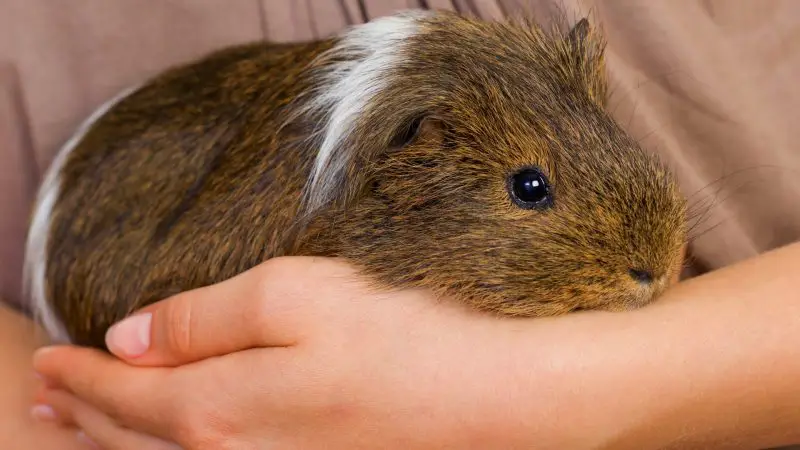
Guinea pigs have a lifespan of around eight years on average. So, if you think that you only want a pet to fulfill your short-term desire, you might want to reconsider your decision. Eight years is a long period to commit, and you will have to stick to it no matter what. It is not any plastic toy that you can get rid of when you don’t want to play anymore.
2. Guinea Pigs Cannot Live Alone
Guinea pigs are very social like us. They love to be around their own kind or even us human beings who care for them. But, they cannot live alone. They can die of depression when left on their own in the cage.
Even if you feed them good food, they can still become stressful if they do not see the people around them. They will need a lot of affection and care. So, if you are somebody who is rarely at home, it is better to not keep a guinea pig.
3. They Multiply Quite Fast
As guinea pigs need companions, we tend to keep them in pairs or groups. But, guinea pigs are quite fertile and can start reproducing when they are just six months old or even younger.
If you are planning to keep pigs of two opposite sex in the same cage, it is important that the male is neutered to avoid filling your house with unwanted guinea pig babies because it will become a lot of work to handle them eventually.
4. Problem with Small Cages
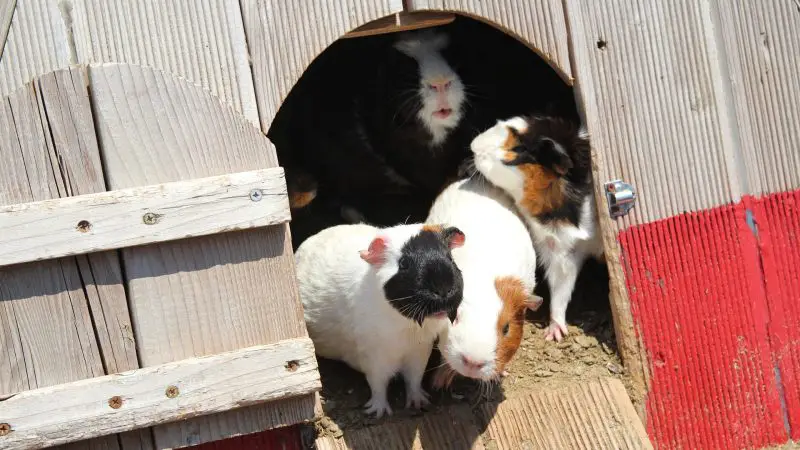
Even though guinea pig is a really small creature, it needs a lot of space. The usual cages that you find in the pet store are too small for them since they need a lot of space to run around. You have to maintain a separate place for them to sleep and run.
Also, if you decide to keep them in a cage, you have to put running mills or toys to keep them busy, or they will become obese which is not good news for your pet. So, you might end up trying to make a new large homemade cage for them, which seems like a lot of work.
Related: Top 10 Best Guinea Pig Cages in 2022: Reviews and Guide
5. Keep Them Safe from Direct Sunlight
Since they are not really good at tolerating heat, you will have to keep an eye on them so that they do not run outside and remain in direct sunlight for too long. It is important to provide shelter and extra bedding to them in winter. So, it sometimes becomes difficult for pet owners to find the right balance.
6. They Need Constant Housekeeping
Guinea pigs are quite messy. They eat and litter too much. If you won’t clean their cage now and then, your house is going to smell like pig’s poo, and it is hard to ignore.
Also, you need to train them to litter in the litter-box. Though they are quite easy to train in comparison to other small animals, they are still animals and do not have the intelligence of a human. So, you might want to be patient here.
There is a disease known as bumblefoot, which leads to swollen feet due to the bacterial infection caused by dirty bedding. So, you need to work on the cleanliness constantly.
7. They Are like Stubborn Kids When It Comes to Food
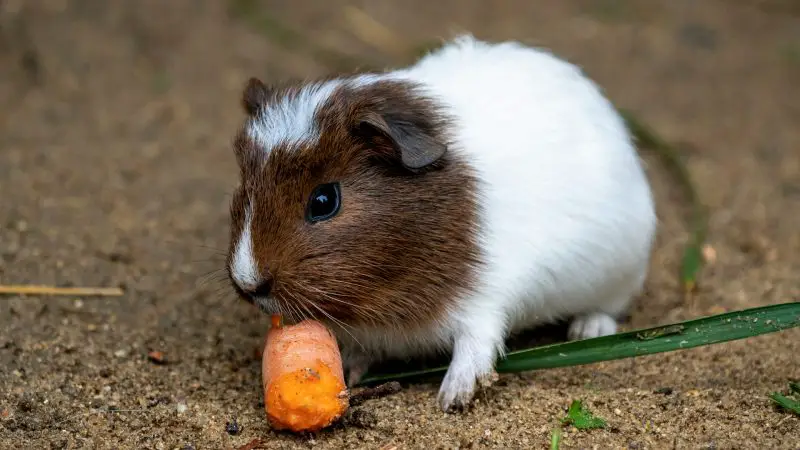
When you bring a newborn guinea pig in your house, you will have to keep feeding them a variety of food. Also, keep in mind that they might be allergic to some foods.
If you stick to one food, for instance, you feed them only carrots; your guinea pig will only eat carrots rest of their life. So it is essential that you feed them a variety of food. Otherwise, once adapted to one food, they would prefer not eating at all and die if you feed them anything other than carrots. Since they are animals, there is not much you can do to make them eat anything against their will.
8. They Don’t Know When to Stop Eating
They will eat continuously if you don’t stop them from eating, leading to overeating, that they can even die from eating. Some people tend to think that their guinea pig is actually hungry while the poor thing has just irresistible attraction to food and it is actually a curse if you look at it. So, it is a bit tough job to keep them away from eating. You have to be careful even while putting hay in their bedding; they might eat that too.
9. Susceptible to a Lot of Diseases
Guinea pigs are susceptible to a lot of diseases. But usually, they do not show direct symptoms which make it hard for the owner to know that something might be wrong with their guinea pig.
Gastrointestinal diseases are most common disease, like diarrhea, which might lead to anorexia. They can easily get pneumonia, which is often incurable. They also get skin diseases like mange easily. Guinea pigs can have dental problems.
10. You Can’t Keep Them with Your Other Pets
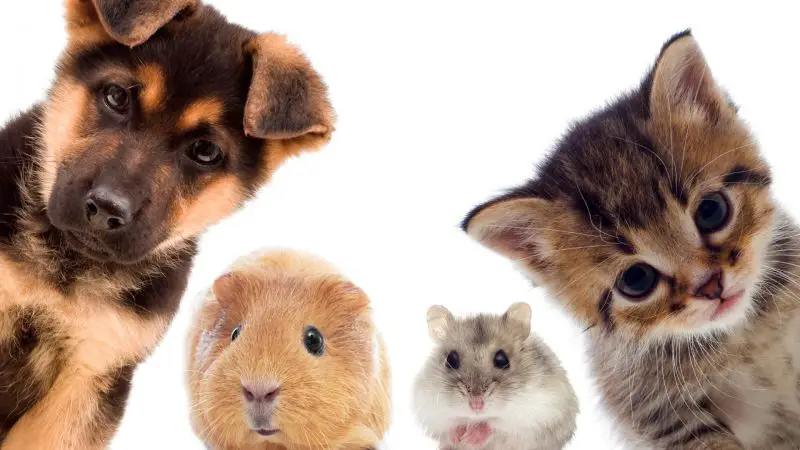
Though guinea pigs are great companions to humans, they might not go well with other pets. Since they are very small, other pets in your house may consider them as food or competition and might bully them. It can be very stressful for them.
11. Your Kid Might Be Allergic to Guinea Pigs
Your kid might be allergic to the fluffy soft hair on guinea pigs that you adore so much. So you need to ensure that your kid is not allergic to them before you bring them into your house. They can cause serious allergic reactions.
12. They Can Be Very Noisy
Guinea pigs are considered quiet animals, but they can be quite noisy especially if they are going through some problem. This is their way to tell that something is not okay. But, it can become a headache if you can’t seem to figure out what’s wrong with them.
Related: Guinea Pig Sounds: Noises Explained, How to Decipher Them & More
13. They Are Very Brittle
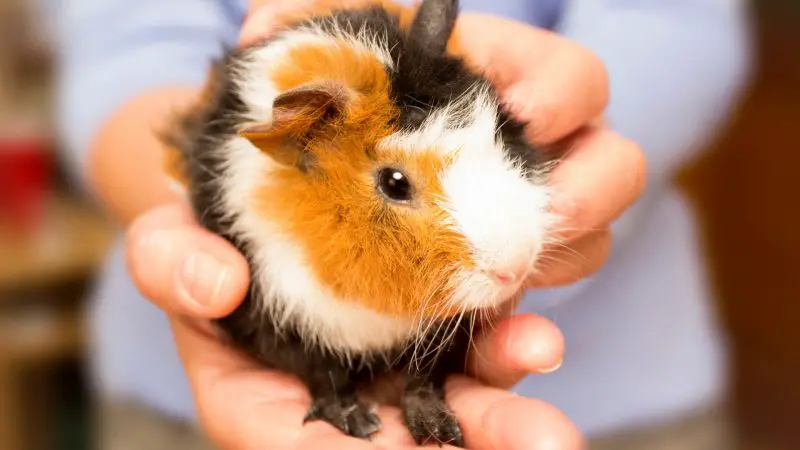
You will need to take care and teach your kids to hold them properly. Guinea pigs are really small and have brittle bones. If not handled carefully, you might break their bones.
Also, you will need to keep them under your supervision because they might hurt themselves falling from the cage if it is kept at height or if they are running around on a table or shelves.
14. They Are Allergic to a Lot of Things
They are allergic to even the most common antibiotics, which makes hard for the owner to protect them from diseases without giving them any sort of antibiotics. Owners need to take the advice of vets, which just increase your bill to the doctor. Also. there are many herbs and shrubs which guinea pigs are partially or fully allergic. Thus, you need to take care of that anything toxic to them does not go into their mouth.
Related: Are Guinea Pigs Hypoallergenic Pets?
15. It Is Hard to Keep Them Fit
Since guinea pigs need to chew a lot to keep their growth of teeth in check, pet owners tend to feed them a lot, which again leads to obesity. This, in turn, can lead to other problems like diabetes and heart-related problems. So, sometimes it becomes a tedious task to keep them fit, especially if you have kids who tend to feed them a lot.
16. They Can Be Little Non-Friendly
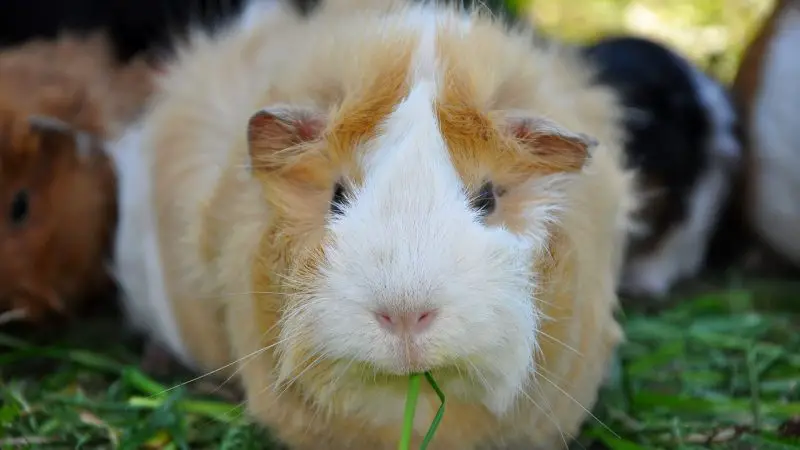
Guinea pigs are usually bought from a pet store. When they come to the new house, they tend to become wary of their new owners. Sometimes, pet owners do complain about their guinea pigs not being friendly and non-responsive to their affection. That’s because guinea pigs become used to one place and companion very early and it is hard to undo it.
Also, all guinea pigs have different personalities. It is hard to tell if you are going to be the unlucky pet owner who gets a grumpy guinea pig or lucky to get a cheerful one.
17. They Poop a Lot
Guinea pigs eat a lot and hence pooping becomes another problem. They poop so much that you have to clean their cage every other day. Otherwise, it will get smelly.
Also, guinea pigs are coprophagous, i.e., they eat their own poop, which is not a very good sight. If kept open they tend to litter almost everywhere, litter training becomes important. But, they are animals and might or might not respond to your wishes so much.
18. They Can Spread Diseases
Rodents have always been infamous for spreading diseases. Diseases like pneumonia, which are caused by bacteria streptococcus, are communicable and can spread to your other pets and even human beings.
Guinea pigs are quite vulnerable to fungal infections and usually, do not show any signs of illness. Moreover, this can be spread to other animals, especially when they are kept in an overcrowded situation.
19. Lice, Fleas and Other Issues
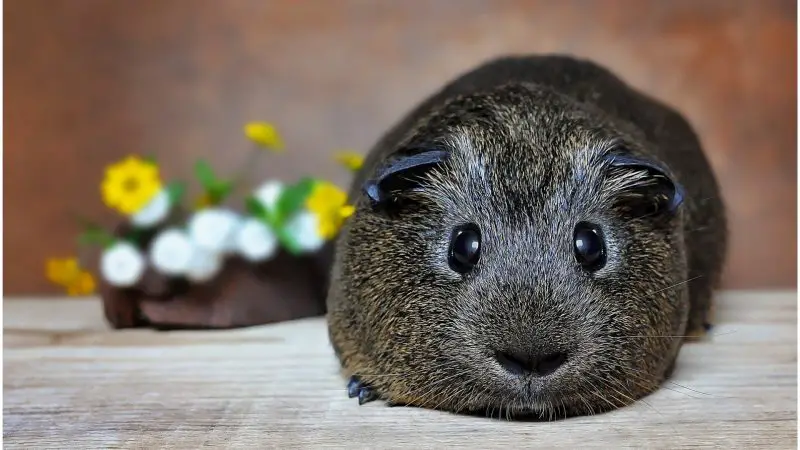
Guinea pigs need grooming time to time and care has to be taken that they don’t get fleas or lice in their fur. Lice eggs are found in the hair shafts, often around the face, head, and ears. Mites can cause itchiness leading to hair fall. So, taking care of the fur of your pet is another responsibility. Once infected, it can become cumbersome to get rid of these things.
20. Barbering
This problem is usually related to boredom. Guinea pigs barber their hair by chewing. Sometimes, the problem becomes serious when the guinea pig starts cutting the hair of other fellow guinea pigs. When it happens, it is time to separate it from others. But again, separation might also lead to more boredom and depression.
21. Heat Strokes
Guinea pigs have a higher body temperature than us humans. Thus, they are more susceptible to heat strokes. As a pet owner, it is always tempting to let your piggies play outside in the grass, but guinea pigs do not respond well to direct sunlight. They get warm quickly and suffer from heat strokes, especially in summers. In fact, carrying them around in your car can be dangerous for them if you do not have an AC in the car.
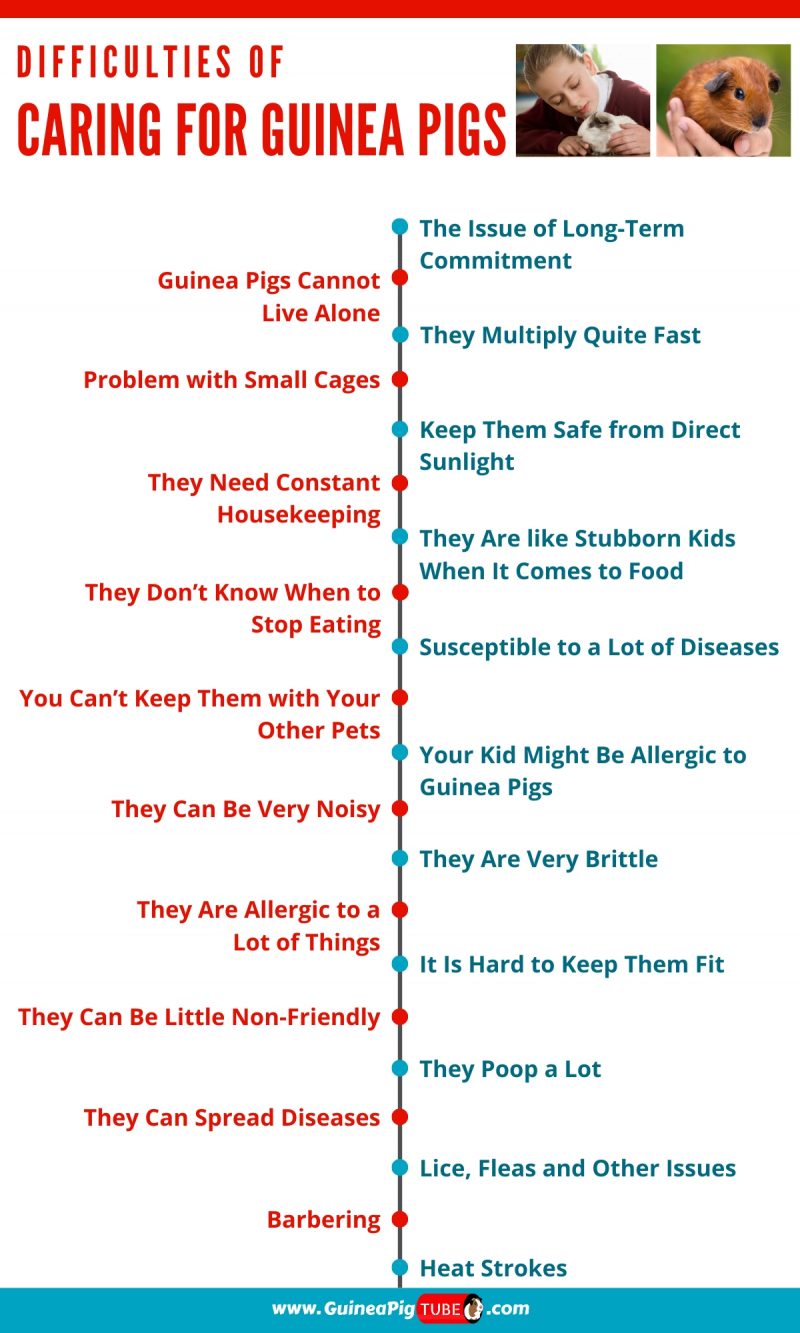
Are Guinea Pigs Better Than Other Animals as Pets?
We will compare the animals which are more or less similar to guinea pigs.
Guinea Pigs and Hamsters
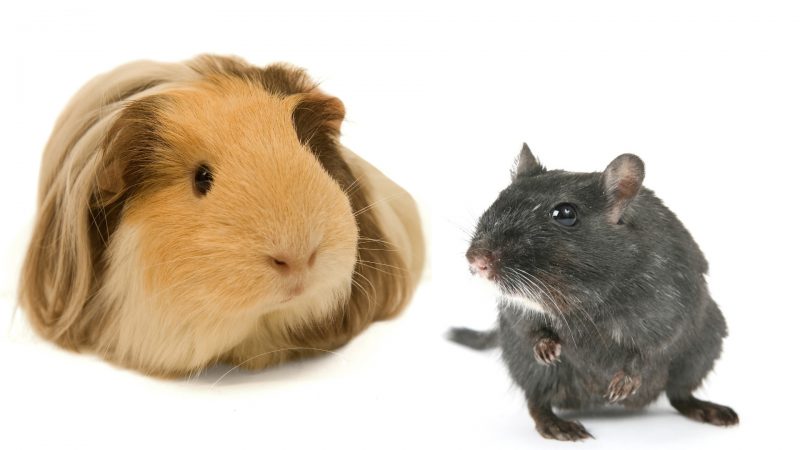
Guinea pigs and hamsters are quite popular as pets. Hamsters are nocturnal and are most active during the night, whereas guinea pigs sleep in short naps and hence can be great to play with as pets. Also, hamsters being up at night can become a disturbance and affect your sleep. When hamsters are disturbed in their sleep during the day, they become grumpy and might bite. Guinea pigs also bite but only when you mishandle them or squeeze them too tightly.
Related: Can Guinea Pigs Eat Hamster Food?
Guinea Pigs and Rabbits
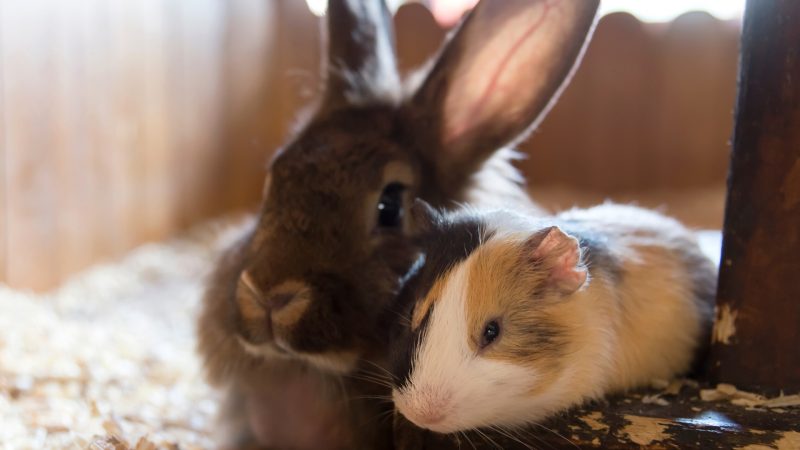
Rabbits and guinea pigs are also often compared when people want to decide between two fluffy animals. While guinea pigs are small and remain in their cage most of the time, rabbits are more like keeping a dog in your house without a leash. Not only rabbits are bigger, but they also require a bigger area and preferably remain outdoors.
Guinea pigs and rabbits should not be kept together because rabbits often try to bully the guinea pigs. Also, rabbits tend to chew on carpets, footwear or anything they find interesting. Like hamsters, they are also nocturnal.
Related: Can Guinea Pigs Eat Rabbit Food?
Guinea Pigs and Ferrets
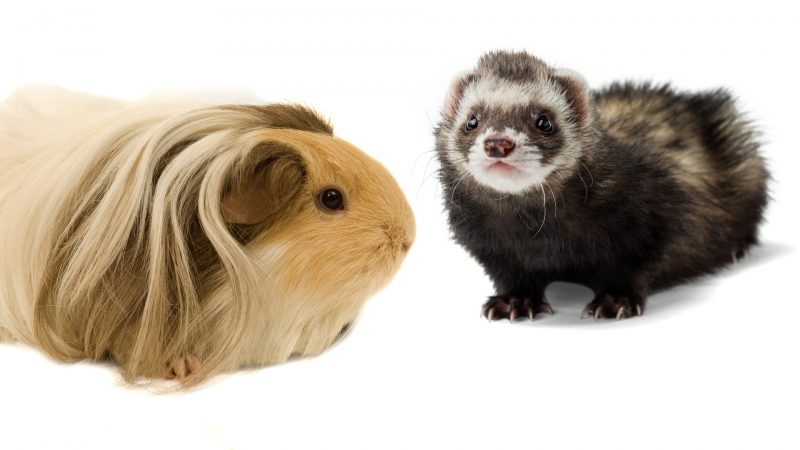
Ferrets are another kind that is often compared with guinea pigs as a pet choice. Guinea pigs are rodents while ferrets are carnivores. Guinea pigs might not like to be handled, but ferrets are more engaging and like to get attention.
Both of these animals smell, so ferrets are a better option than guinea pigs. Ferrets are usually more smart and fun as compared to guinea pigs. Having ferret is more like having a kitten that never grows up.
Guinea Pigs and Rats
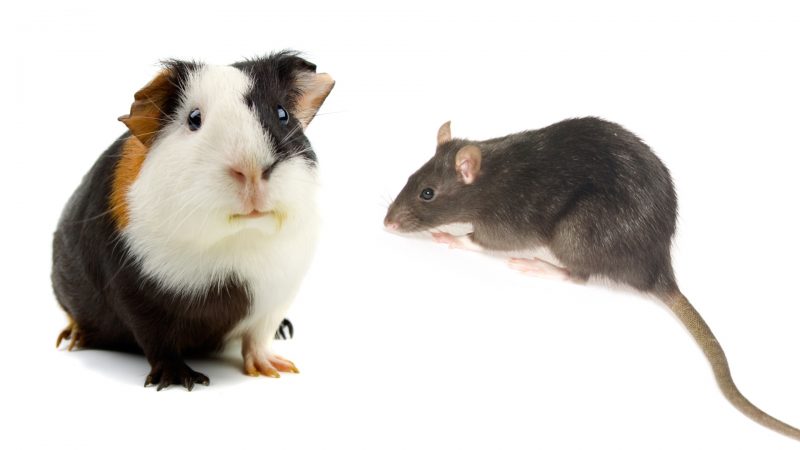
If you are planning to choose between a guinea pig and rat, remember that rat has a very short life span of a maximum of 3-4 years while guinea pigs may live up to eight years or even more in some cases. Guinea pigs are crepuscular while rats are nocturnal.
Guinea pigs are more costly than rats when it comes to their grooming and care since they are more susceptible to diseases. Also, guinea pigs will eat more due to their bigger size as compared to rats.
While you will have to keep guinea pigs in pairs or groups, rats can live alone. If you have a busy life and can’t give much time to your pet, then the rat is the best option. But if you have enough grass, space and time, then go ahead with the guinea pig.
So, you might want to consider the list above before you decide to bring a baby guinea pig in your house. They are lovely animals but certainly need to be taken care of like any other animal. They are great pets, and your kids will love them.
Also, you can compare them to other animals so that you make an informed decision. Choosing the right pet for your house is very important and a hard decision so please take your time. Best of luck!
List of Sources
Caring for Your Pet Guinea Pig
Guinea Pigs: Good Practice for Housing and Care
Dietary Requirements of the Guinea Pig With Reference to the Need for a Special Factor
